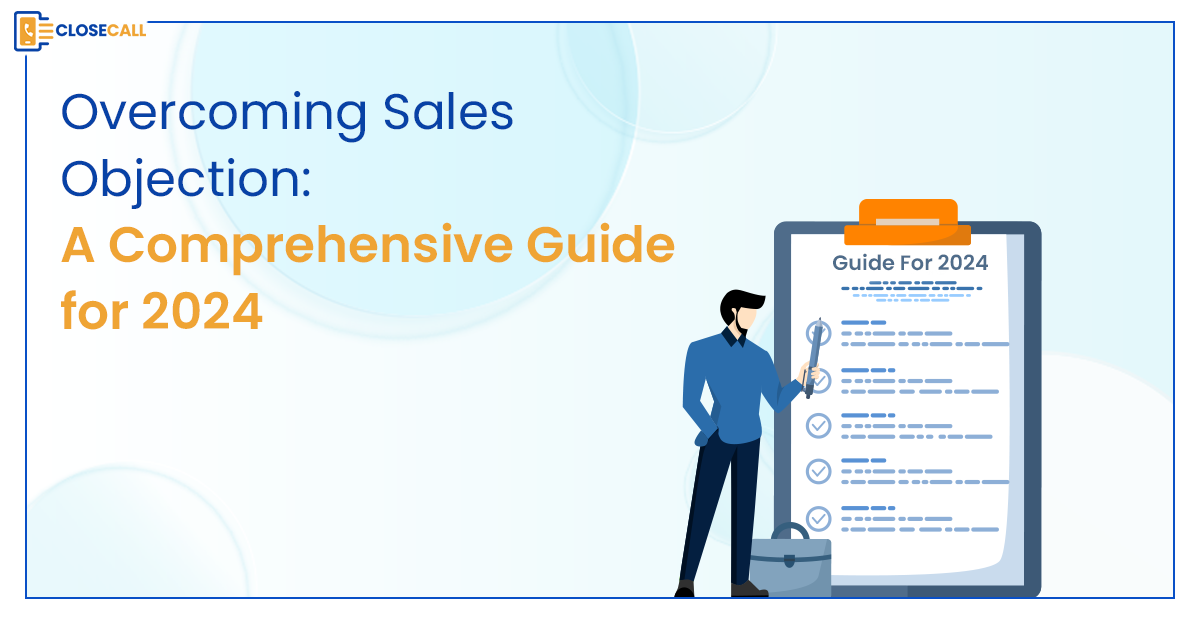Are you pissed off facing the same sales objection over and over again? Worried about how to overcome this. Overcoming sales objection is a very crucial part of business sales. Now, maybe you are wondering how you would do this. Don’t worry, you are not alone. Reaching your sales targets and closing agreements might be significantly hampered by sales objections. But fear not because, in this blog, we will discuss some common sales objections and proven tactics to overcome them in 2024.
For call centers, successfully addressing sales objection is critical since it has a direct impact on customer retention, revenue creation, and overall customer satisfaction. Call centers that are skilled in handling complaints not only build client loyalty but also raise the possibility of turning leads into devoted patrons. In addition to creating chances for upselling and cross-selling, successfully resolving objections improves brand reputation and provides the call center with a competitive edge in a fast-paced industry.
Let’s read this blog to improve your business quality:
What is a Sales Objection?
A sales objection is a sign that a certain factor is keeping a potential customer from purchasing from you. Sales representatives rarely say “no” when they have a sales objection. A common error made by sales representatives is to view a sales objection as a more polite way of saying no. A sales specialist, however, will view each objection in sales as a plus. It indicates that the potential client is receptive to information and is not ready to give up on the partnership. Sales representatives should use the chance to get to know their prospects better and identify targeted approaches to allay any concerns they may have.
Importance of Addressing Sales Objections
An effective salesperson must respond to sales objections from the customer. A successful understanding and management of objections might mean the difference between a failed sale and a devoted client. You may establish credibility and trust by confronting issues head-on and offering convincing answers, which will help you seal the transaction.
Objections are given in the sales process. Consumers could be worried about the goods, the cost, or even the company’s standing. These objections may be raised for several reasons, including ignorance, apprehension about making the incorrect choice, or a simple desire to bargain for a better offer.
Dealing with sales objections is crucial because it gives you a chance to show off your proficiency and familiarity with the commodity or service you are trying to sell. When a consumer voices an objection, you have the chance to demonstrate that you comprehend their worries and offer them pertinent facts that will allay their suspicions.
Additionally, answering sales objections promotes credibility and confidence in the client. It demonstrates your sincere concern for their requirements and willingness to go above and beyond to meet them when you take the time to listen to their worries and offer considerate answers. By doing this, you can improve the customer relationship to a great extent and raise the likelihood of sealing the deal.
Addressing sales objections also gives you a chance to get insightful input regarding your product or service. Objections frequently point up places where your offering could be lacking or where it could be strengthened. You may improve your sales pitch and make the required changes to better suit your consumers’ demands by carefully listening to their concerns and considering them.
Addressing objections can also help you find objections that the customer may not have mentioned at first but that are there. Customers may occasionally harbour hidden worries or hesitations they would not feel comfortable disclosing. When you answer objections directly and honestly, you give the consumer a safe place to voice their actual worries. It helps you address the objections successfully and raises the likelihood of a successful sale.
All things considered, handling sales objections is an essential ability for any salesman. It gives you the chance to not only establish credibility with clients and demonstrate your skills but also to get insightful feedback and identify any unspoken concerns. Understanding and addressing objections well will greatly improve your chances of completing the business and gaining the trust of prospective clients.
What are the Reasons for Sales Objections?
Objections are an obvious part of the sales process. No matter whether a sales professional is just starting or a seasoned expert, they must develop the ability to negotiate and overcome obstacles to close agreements and meet their goals. This chapter will examine the various forms of objection in sales, their psychological underpinnings, and the reasons why comprehending sales objections is essential to successful sales.
Price Objections
Customers frequently raise price objections in sales talks because they want to make sure they’re getting the best deal possible. These objections could be brought up by financial limitations, a sense that the product isn’t worth it, or a wish to haggle for a better price. Resolving these issues can be facilitated by being aware of the customer’s worries and being ready to defend the cost or provide flexible payment arrangements. It is one of the significant reasons for sales objection.
Product or Service Objections
Consumers may have queries concerning the product or service, such as its attributes, advantages, or calibre. These criticisms may be from a lack of comprehension or from contrasting your product with that of a rival. To properly address these arguments, you must have a thorough grasp of your product or service and be able to articulate its special value proposition.
Timing Objections
When a customer wants to postpone making a purchase or isn’t ready to commit, they raise timing objections. It could be the result of external factors like market conditions or internal issues like waiting for budget approvals. Understanding the customer’s schedule and coming up with strategies to increase the purchase’s appeal—like providing time-limited rewards or highlighting the possible consequences of doing nothing—are key to overcoming scheduling obstacles.
Trust Objections
It is one of the key reasons for sales objection. When a customer questions the veracity of your business, the salesman, or the claims made about the goods or services, they may raise a trust complaint. Addressing these arguments might be especially difficult because they call for building credibility and trust with the client. Trust issues can be reduced by offering social proof, such as case studies, expert endorsements, or testimonies.
Fear of Change
Customers who are afraid of change may put off making a buying choice. This apprehension may arise from worries about the possible disturbance a novel product or service might bring about or the ambiguity of its influence on their enterprise. By outlining the advantages of the shift and assuring them that the transition will be easy to handle, these anxieties can be alleviated. It is one of the substantial reasons for sales objection.
Skepticism
Customers who have doubts about the claims made about a product or service are prone to being doubtful. They can doubt the veracity of the information offered or be leery of sales efforts that appear too good to be true. Salespeople should present reliable, lucid information and support their assertions with third-party reviews or unbiased data to dispel doubts.
Misinformation
Customers may occasionally object to your goods or services because they have false knowledge. This false knowledge may originate from rival businesses, prior encounters, or presumptions, among other places. To resolve these objections, it is necessary to gently clarify any inaccurate information and provide the consumer with current, accurate information so they can make an informed choice. It is one of the key reasons for sales objection.
Financial Concerns
Closing a sale might be significantly hampered by financial worries. Consumers could be worried about the return on investment or how affordable a good or service is. Salespeople in these circumstances need to be ready to answer financial concerns from clients by outlining the benefits of their product and providing alternatives like financing or flexible terms. It is one of the significant reasons for sales objections.
Strategies to Overcome Sales Objections in 2024
The sales landscape of the sales industry is continuously evolving, so it becomes very crucial for sales professionals to stay ahead of objections and continuously find new ways to convince or address them. Below, we will explore some effective strategies that can ensure your success in the cutthroat market 2024 by helping you foresee and overcome sales objections.
Listen Fully to the Objection
Your first reaction when you hear an objection in sales may be to jump right in and respond immediately. We must suggest that you resist this temptation. You run the danger of assuming something about the objection when you respond quickly. Instead:
Spend some time paying close attention to the objection.
Avoid Taking a Defensive Stance
Learn to push aside any unpleasant feelings you may be experiencing and concentrate only on the buyer’s comments and the business issue you are assisting in solving.
Without prejudice or expectation, listen to understand the buyer’s concerns completely.
Make sure the buyer knows you are paying close attention by letting them know through your vocal affirmations and body language.
Empathy and Rapport Building
Empathy and rapport building helps in overcoming sales objection in 2024. Empathy is the way to put yourself in the customer’s shoes and know their concerns and perspectives. To build a relationship with a customer, you need to make a genuine connection and show that you understand their needs. Show empathy and build a relationship.
- Validate the customer’s feelings and concerns.
- Express understanding and relate to their situation.
- Share personal experiences or stories that illustrate your understanding of their concerns.
Repeat Back and Ask Them to Expand
There are two steps involved in the next phase of overcoming sales objections in interactions.
First and foremost, you should convey empathy and avoid being confrontational since this will only sour the relationship. If necessary, repeat back to them what they’ve said in dot form to show that you genuinely care about what they’re asking for. This is how you demonstrate empathy. In the second section, we’re asking them to elaborate.
It is crucial because, in addition to losing the sale, you will damage your relationship with them if you try to address their problem based on unfounded assumptions. You’ll discover that it becomes simpler to overcome concerns in sales interactions if you encourage them to elaborate. In many cases, they’ll realize that their issue isn’t that serious.
Most likely, it’s a fear of change. But before we move farther, we want to make sure it’s fully dissipated.
Anticipate Objections
One of the most crucial elements of effectively handling concerns is being proactive. Examining previous sales exchanges and customer reviews can teach you a lot about the common concerns that are voiced during the sales process. With this information, you can react effectively and prepare ahead to get a competitive edge.
It also demonstrates your industry knowledge and experience in anticipating complaints. When prospects feel that you have thought through their potential concerns and have thoughtful solutions, they are more inclined to believe your advice and regard your product or service as a viable option.
Remember that challenges are not impediments but opportunities for you to prove your skills and trustworthiness. Being proactive can help you turn objections into productive conversations that lead to successful sales outcomes.
Validate Your Prospect’s Concerns
Once you have acknowledged their concerns, proceed to establish confidence by confirming their issue.
Regardless of how legitimate the objection in sales is, you still need to convince the prospect that their worries are real.
You risk losing a potential customer if they believe you aren’t paying attention to their concerns.
However, this does not imply that you have to speak poorly of your goods or services. Rather, make an effort to understand them better and explain how you may assist in resolving their issue.
Understand Their Reason for Risk
Before responding with your arguments for why they ought to purchase, ascertain the causes of their objection in sales. Let’s examine an instance where a sale would result from listening and understanding, for illustration.
What won’t function well is
Customer A: “I don’t feel like the product or service is worth its price.”
Agent B: “These are the reasons why it is.”
Here, you have provided them with justifications without posing the question of why they believe your good or service is not worth the cost. Some people might be won over by your general arguments, but others might not agree with you as quickly. Instead, adhere to this script:
Customer Y: “The product doesn’t seem like it’s worth my money.”
Agent X: “Oh, well, can you please tell to me why you feel like that?”
Customer Y: “I wanted to buy the product in the first place because it doesn’t have the features I am looking for.”
Agent X: “Oh, I understand. However, did you know that this product includes two of those three features? Also, the function you are seeking—which we don’t offer—does more harm than benefit.
By doing this, you are catering your reasons to the demands of your clientele. Your customer appreciates that you can listen to them, and you now have a deeper understanding of their demands than before. If none of those features are available on the product they are viewing. However, you do draw their attention to a related product you sell. By doing this, you can be sure that you have closed a deal and that the client is happy with your understanding of their demands.
How to Prevent Unnecessary Sales Objections?
No matter how good you are at selling, objections are bound to come up during the sales process. But here’s the thing: great salespeople can prevent many of these objections from happening in the first place.
Think about objections you’ve probably heard before:
“We don’t have the budget for this right now. Call us again next quarter.”
“Why should we change when what we have already works?”
“We have too many other things to focus on right now.”
Now, take a moment to think about which objections could be avoided and which ones are unavoidable. The key is to focus on your selling approach to minimize unnecessary objections. Often, customers raise sales objections not because of what you’re selling but because of how you’re selling it.
For example, if you talk too much about features, don’t listen to the buyer, or fail to ask enough questions to understand their needs, objections are more likely to arise.
To prevent these objections, you need to better uncover and address the buyer’s needs. Help them see how your product can meet those needs.
First, successful salespeople keep asking questions until they fully understand what the buyer needs. They listen carefully to what the buyer is saying. Explain the benefits of your product in a way that helps the buyer connect their needs with what the product offers. It’s all about selling based on value, not just listing product features. You can also prevent sales objections by installing call management software on your employee’s phone.
Why is that Important?
Buyers don’t care about product features on their own.
They only value features when they see how those features can solve their specific problems. If buyers don’t see the connection between their needs and your proposed solution, they won’t see the value in it. And when that happens, they’ll likely raise objections about the price.
Now, let’s talk about another common mistake.
Sometimes, salespeople struggle when faced with objections related to company policies, technological limitations, or regulations.
For example, let’s say you’re selling a software application and find out early on that it doesn’t integrate with the buyer’s accounting system. So, what should you do in this situation?
At the beginning of the sales process, make sure to highlight the value of your solution. It’s a good idea to bring up the integration issue before the buyer does. By addressing it upfront, you can explore alternative options together. If the sales objection comes up towards the end of the sales process, the buyer may feel deceived, and there may not be enough time left to find alternative solutions.
We must say that when a buyer indicates that they are not ready to buy, don’t get disappointed. Try some lucrative ways to impress your customers and convert them into their potential customers.
Most Common Sales Objections
Sales objections can indicate that you haven’t persuaded the buyer of the value of the offer with enough vigour. Sales objections typically fit into one of the following types:
- Need: The buyer is not yet aware of or willing to acknowledge the need to find a solution.
- Urgency: The buyer is still unaware of the urgency of the situation.
- Trust: The buyer has doubts about you, your business, your solution, or your results.
- Money: The buyer expresses that there will be a financial hardship.
Sound familiar? Even though it may seem difficult to overcome these typical sales objections, but remember that an objection is a sign of customer engagement, which is preferable to disinterest.
But there’s still work for you to do.
How Do You Establish Trust & Desire?
Overcoming sales objections begins early in the sales process and occurs when you’re having sales discussions, most so when you’re posing questions during the sales interview.
Before you can begin your sales interaction, you must first determine whether or not they are eligible for your offer.
We advise applying the BANT technique to determine their eligibility to avoid future sales conditions and objections.
BANT stands for:
- Budget
- Authority
- Need
- Timeframe
You won’t have much desire if there isn’t a deadline or a need, which makes it harder to overcome objections in sales meetings.
Second, you create desire by posing insightful and in-depth sales inquiries that elicit feelings of agony and longing for the consequences of solving their difficulties.
The more suffering you uncover, the more your need will be to find a cure.
Building a strong relationship with your customers and strategically placing questions that show empathy and understanding and that you’re here to help them solve their problems rather than close a deal are two ways to earn their trust.
When selling, a lot of sales professionals take the incorrect approach.
- They establish a rapport.
- Then, the pitch or presentation begins.
- Then, they inquire if anyone has any further questions.
- Managing objections and requesting the sale
Not only is this model dated, but it is also widely used.
Thankfully, you came across this blog page, so you won’t have to make the same error your rivals have.
This antiquated approach is known as premature presentation, and it is severely hurting your sales.
Conclusion
You can convert the sales objections into opportunities after properly handling them. Managing objections allows you to strengthen your bond with the potential customer. It improves your comprehension of the demands of your clients. You show that you are patient, sensitive, and sincere by letting the connection develop naturally. Fulfilling these expectations lays stronger groundwork for further interactions with the client. In 2024, handling sales objections will be a critical ability for salespeople. You may turn objections into chances to improve relationships, boost sales, and ultimately succeed in today’s cutthroat industry by comprehending the nature of objections, adjusting to new difficulties, and utilizing successful tactics.



